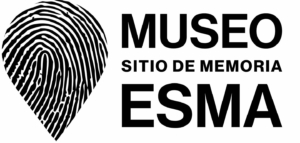In the context of the temporary exhibition THE WORLD CUP AT ESMA. Testimonies, Objects and Experiences. Living in the Clandestine Center During the 1978 World Cup, the Museum organized a Public Conversation between sports journalists Juan José Panno and Ezequiel Fernández Moores entitled Reflections on the 1978 World Cup. The event was moderated by Alejandra Naftal, director of the ESMA Museum and Site of Memory. The activity also included the participation of survivor and witness Alfredo “Mantecol” Ayala, who was kidnapped at the ESMA clandestine center during the 1978 World Cup.
“That World Cup felt strange, but I didn’t know why. I became aware thanks to foreign journalists”, said Ezequiel Fernández Moores, who stressed the information and reports that were circulating abroad more than they did in Argentina. “At first I was also very angry with myself, but the World Cup was essential for me to realize why I work in journalism. How you can report on what is happening in the country and to the people through a soccer ball.”
“The stadium is about 20 minutes away from here. I can only imagine how people could hear the World Cup cheers from here, but the most horrible thing is to know that no one heard the screams coming out from here. I always feel the guilt of not having done enough, even if I never wrote a single line in favor of the dictatorship, because I worked for El Gráfico magazine, and we went through a very contradictory period of time”. Juan José “Nene” Panno.
“While listening to you I went back to 1978 in my mind. We had nothing against the players. The World Cup kind of saved my life because in those months they took me down from Capucha to the Basement, and from then on we started to build the infrastructure to assist the organizers of the Tournament. The day Argentina won they took us out to celebrate in four cars, through Cabildo and 9 de Julio avenues. Then they took us to a steakhouse, I was shackled. The whole time we thought they were going to kill us.” Alfredo “Mantecol” Ayala.



